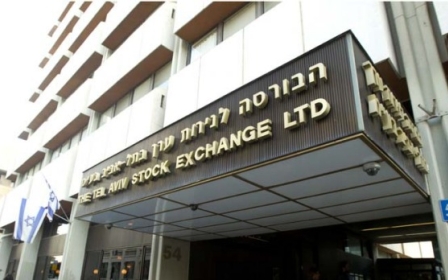Bank stocks dip in Israel after report calls for EU to act against settlements

The European Union has been urged to curb its dealings with Israeli banks in line with its own policies, in a new report that has caused a splash inside Israel.
In a report released on Wednesday, the European Council on Foreign Relations advised Europe, Israel’s largest trading partner, to do more to differentiate between the Israeli state and its settlements, which are deemed illegal under international law.
"Under its own regulations and principles, Europe cannot legally escape from its duty to differentiate between Israel and its activities in the occupied Palestinian territories," says the report.
Wednesday’s report urges a strengthening of this policy, known as “differentiation,” to include more of Israel’s infrastructure including financial institutions and universities.
Following the report’s release, stocks in four large Israeli banks dipped sharply. Leading Israeli media outlets later linked the sharp fall to the report.
Last month, writers of a UN report suggested that a 50 percent drop in foreign investment in Israel during 2014 could be down to negative press surrounding last summer’s military campaign in Gaza, as well as “the boycotts Israel is facing”.
Israel’s Ministry of Foreign Affairs put out a terse statement on Wednesday affirming that it would not comment on the report. Instead, the government highlighted comments from Italian Prime Minister Matteo Renzi, who used a visit to Israel on Tuesday to disavow boycott policies, which he called “foolish and futile”.
There is already growing pressure within some circles of the EU for the union to introduce strict guidelines that would see companies clearly label products manufactured in these settlements, rather than labelling them as “Israeli” goods.
However, the ECFR says the EU should use its leverage and pursue a policy of differentiation in the financial sector in order to pressure the Israeli government to curb its settlement building.
Large Israeli financial institutions deal frequently with European banks, while at the same time helping to finance Israeli individuals and companies based in the settlements.
According to the report, this goes against the EU’s own rules, which were set out in 2013 to prevent settlements profiting from EU money.
The report advises the EU to ramp up the pressure by moving from what it calls “ritualistic” condemnations of settlement activity to targeting the EU’s dealings with Israeli financial institutions involved in settlements.
The report also suggests the EU should stop recognising academic qualifications from institutions based in the West Bank, since the union does not recognise Israel’s jurisdiction over those areas.
The report’s release comes after EU foreign ministers on Monday reiterated their intention to ensure “implementation of existing EU legislation” regarding the labelling of settlement products “in line with international law".
Ministers this week also called on Israeli authorities to halt plans to demolish Palestinian villages in the West Bank.
Despite these recent moves to criticise its policy, the EU remains a key partner to Israel, and has historically aimed to toe a difficult line between maintaining strong diplomatic relations while questioning some aspects of Israeli domestic policy.
However, with Israeli politicians concerned by a recent international nuclear deal with long-time foe Iran and by Palestinian attempts to achieve statehood, the report’s authors say the EU can increase its leverage by pursuing more clear-cut policies towards Israel.
“Up until now the differentiation policy has been constantly held hostage to political considerations of EU leaders,” says Hugh Lovatt, ECFR’s Israel/Palestine co-ordinator and one of the authors of the report.
“They would say now is not the time to rock the boat, because peace negotiations are about to start or there’s a new Israeli government. Now there is no excuse not to progress down this path.”
“The US has stepped back from the Middle East peace process, at least for now – there is now a European moment to help create conditions for a meaningful peace process.”
Stay informed with MEE's newsletters
Sign up to get the latest alerts, insights and analysis, starting with Turkey Unpacked
Middle East Eye delivers independent and unrivalled coverage and analysis of the Middle East, North Africa and beyond. To learn more about republishing this content and the associated fees, please fill out this form. More about MEE can be found here.




